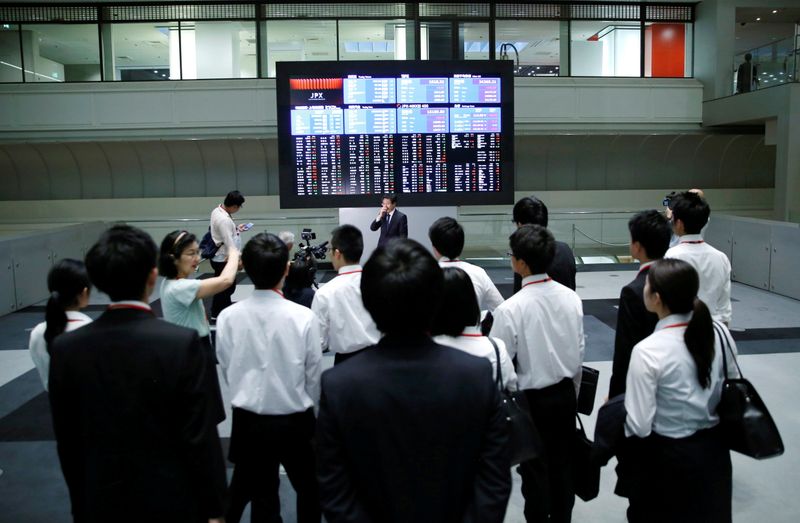By Makiko Yamazaki and Yuki Nitta
TOKYO (Reuters) -Tighter requirements to stay on the Tokyo bourse's prestigious main board are forcing Japanese companies to cease long criticised practices such as cash-hoarding and cross shareholdings, even as some investors call for tougher reform.
In the biggest overhaul of Japan's stock markets in a decade, Tokyo Stock Exchange will introduce next year tighter listing criteria for the top category, which 30% of almost 2,200 companies listed on its main section currently do not meet.
The reform is meant to create a higher profile for firms with global corporate governance and profitability standards as well as disclosures in English for the main board to attract foreign investment, a policy drive that began under the former Prime Minister Shinzo Abe.
Stricter rules for liquidity - market capitalisation in tradable shares of at least 10 billion yen ($90 million) with a tradable share ratio of 35% or more - are especially tough for small caps firms or those largely owned by parent companies or business partners.
Many small cap firms "previously had little urgency to increase share prices, but the new rules are having a huge impact on their mindset," said Atsuko Furuta, director at investor relations consulting firm IR Japan.
Road construction machinery maker Sakai Heavy Industries Ltd last month vowed to stay on the main board, launching share buybacks and setting its dividend payout ratio target at 50%. Shares have surged by over 20% since the announcements.
"All we can do to meet the market cap requirement is to raise share prices," executive officer Takao Yoshikawa told Reuters. "We now plan to return capital in excess to shareholders instead of hoarding it to boost return on equity, a gauge that investors care about."
Similarly, chemicals trading firm Soda Nikka Co announced its largest-ever share buybacks and pledged to raise its payout ratio target to 40% from 30%.
For many, being listed on the TSE's first section, to be renamed "prime market" in April, is a status symbol.
"The first section status means our creditworthiness to clients, lenders and new hires," Hideo Tanaka, CEO of realtor A.D. Works Group Co told a media briefing. "We must do whatever it takes to be on the prime market."
The tradable share ratio rule also affects some larger firms, prompting them to unwind cross-shareholding, where firms hold stakes in each other to cement business ties.
The longstanding practice has been criticised as creating a cozy relationship between management and large shareholders, though the percentage of such shareholdings have halved to less than 15% in two decades, according data from Nomura Institute of Capital Markets Research.
Automotive components maker Toyota Boshoku Corp asked Toyota Motor (NYSE:TM) Corp to release part of its stake to meet the 35% target, while foods wholesaler Mitsubishi Shokuhin Co launched a tender offer to buy back some of its shares owned by trading firm Mitsubishi Corp.
"WASTED OPPORTUNITY"
TSE says the overhaul is designed to bring clear concepts for each market segment, designating the prime market to companies that can have "constructive dialogue with global investors."
"It's been said that for some companies, listing on the first section has been their final goal and they make no efforts to improve once that's achieved," Hiromi Yamaji, the head of the bourse, told Reuters this month.
But some investors said the new criteria are still too lax to make much impact, noting the reform's initial ambition was to narrow down to some top 500 firms for TSE's Topix index, which currently includes all the companies listed on the main board.
"The S&P 500 index for example is far more selective, while the prime market will likely allow firms with governance concerns," said Taku Ito, chief portfolio manager at Nissay Asset Management. "This is an opportunity wasted."
Companies that fail to meet the new rules can still apply to remain on the prime market for an unspecified transition period by submitting improvement plans by December, another point that some investors say waters down reforms.

If those not meeting the criteria remain listed on the prime market indefinitely, "the reform will be meaningless," said Atsushi Kamio, senior researcher at the Daiwa Institute of Research.
($1 = 110.5200 yen)